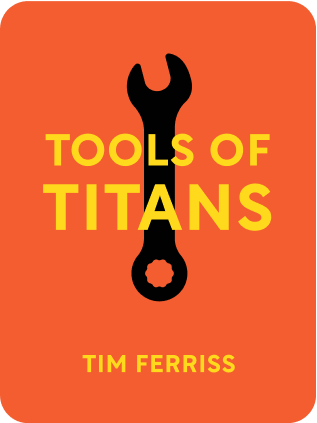

This article is an excerpt from the Shortform book guide to "Tools of Titans" by Timothy Ferriss. Shortform has the world's best summaries and analyses of books you should be reading.
Like this article? Sign up for a free trial here .
Are you looking for Tools of Titans quotes by Tim Ferriss? What are some of the most noteworthy passages worth revisiting?
In Tools of Titans, Tim Ferriss shares the habits and beliefs of 101 high-performing people, including tech investors, entrepreneurs, athletes, and entertainers. The premise of the book is that if you emulate the habits and beliefs of people who succeed the way you want to succeed, you too can be successful.
Here are some quotes and passages that highlight some of the key points from the book.
Tools of Titans: The Tactics, Routines, and Habits of Billionaires, Icons, and World-Class Performers
In his epic 707-page Tools of Titans, Tim Ferriss shares the habits and beliefs of 101 people at the top of their game, including tech investors like Chris Sacca and Peter Thiel, entrepreneurs like LinkedIn’s Reid Hoffman and Evernote’s Phil Libin, superhuman athletes like Amelia Boone and Wim Hof, media figures like Edward Norton and Whitney Cummings, and more.
Below are a few Tools of Titans quotes that highlight the common themes that emerged from the interviews.
“The most important trick to be happy is to realize that happiness is a choice that you make and a skill that you develop. You choose to be happy, and then you work at it. It’s just like building muscles.”
Being productive and reaching your goals obviously aren’t the only important things in life. Being happy and in control of your emotions is another form of success important to titans. In discussing happiness, many titans expressed the same sentiment—happiness is a choice. For example, founder and investor Naval Ravikant asserted that happiness is 1) an active choice you make, and 2) a skill you develop, like exercising a muscle.
“Creativity is an infinite resource. The more you spend, the more you have.”
Multiple people profiled in the book reinforced this idea—creativity requires creativity. If you want to increase your chances of coming up with a creative idea, create LOTS of ideas, even if they’re silly. What matters isn’t your hit rate, but rather the number of good ideas you have at the end. The more ideas you generate, the more you exercise your “idea muscle.”
“If you let your learning lead to knowledge, you become a fool. If you let your learning lead to action, you become wealthy.”
Success doesn’t come from knowledge, it comes from action. Here are some of the titans’ quotes and stories around taking action:
- Author Derek Sivers: “If [more] information was the answer, then we’d all be billionaires with perfect abs.”
- Author and speaker Tony Robbins: An infographic doesn’t make you a master. What matters isn’t what you know—it’s what you do, consistently.
- Artist Chuck Close: Don’t feel you need to have that perfect idea before you start doing. Most likely you’re just holding yourself back. Only amateurs rely on inspiration—experts just get to work. While working, you’ll find new opportunities that wouldn’t be obvious if you just sat there thinking.
- Youtuber Casey Neistat: You can never count on being the most capable, most talented, most attractive person. But you can always compete by working hard.
- Entrepreneur and investor Naval Ravikant: Free information is everywhere on the Internet. What’s scarce is the desire to learn it.
- Filmmaker Rob Rodriguez: While in college, Rob started a comic strip. He’d try to get ideas by staring at the wall, but then found he was much more successful when he just started drawing and improving on it. If you wait for inspiration to hit, you’ll never act.
- Comedian and actor BJ Novak (The Office): Commit to future actions when you’re in a high-energy state, so you can’t back out. He suggests first-time comics book their first week of shows well in advance, so they can’t back out after a bad performance.
“Happiness is wanting what you have.”
One of the most common themes from titans throughout the entire book was being grateful for life and happy for what’s given so far. Far from being the cutthroat, take-no-prisoners stereotype of success, the titans tended to reflect on their lives and find happiness by practicing gratitude for what they have. Here’s a summary of how titans feel gratitude:
- Tony Robbins believes gratitude prevents you from feeling anger or fear. He starts off his morning by meditating on what he’s grateful for.
- Tim Ferriss recommends naming 3 new things you’re grateful for in an end-of-day 5-minute journal. Instead of repeating the same things like your health, consider small things, like an old relationship that really helped you, something great that you saw happen, or something simple that you can see.
- Tim Ferriss also keeps a “Jar of Awesome.” He adds an entry on a slip on a slip of paper whenever something cool happens in a day, and he opens one when he needs an emotional boost. These little wins are easy to forget.
- Author Seth Godin: Why fixate on all the times someone betrayed or rejected you? It makes more sense to keep track of all the times it worked, all the times you took a risk and it worked out. You can control your own narrative, and there isn’t much benefit to being angry and negative all the time.
- Navy SEAL Jocko Willink reads about human suffering, like the My Lai massacre, to be grateful for what he has. Similarly, Youtuber Casey Neistat recommends reading Little Dieter Needs to Fly, a book about a Vietnam prisoner of war that will make you appreciate your cushy life.
- Founder of the Spartan Race, Joe de Sena was inspired to start it after getting fed up with Wall Street. He wanted to suffer in nature and return to a time when he’d just want water, food, and shelter, which would make all his other needs pale in comparison.
- Being grateful for past successes helps you acknowledge that you are capable, instead of fixating on your many failures. This avoids the paralysis from feeling you’re not good at anything.
- If you’re afraid of taking a certain action, reflecting on similar past actions helps you realize the outcome will be good, and it won’t be as painful as you think it is.
- Being grateful for other people inspires a cooperative spirit. You often need other people for success, and thanking past connections helps you seek more connection.
- Neurologically, feeling good about memories positively reinforces the behavioral circuits that produced those memories. For instance, you might be grateful for that one time you reached out to a long lost friend and had a great weekend together, which will encourage you to behave that way again in the future.)

———End of Preview———
Like what you just read? Read the rest of the world's best book summary and analysis of Timothy Ferriss's "Tools of Titans" at Shortform .
Here's what you'll find in our full Tools of Titans summary :
- The habits and beliefs of 101 people at the top of their game
- Tim Ferriss' list of 17 questions you should ask yourself to challenge your thinking
- How emulating the habits of successful people you look up to can make you successful as well






